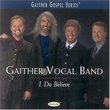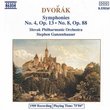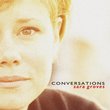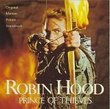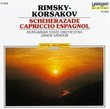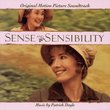| All Artists: Dmitry Shostakovich, Eder Quartet Title: Shostakovich: String Quartets (Complete), Vol. 5 Members Wishing: 0 Total Copies: 0 Label: Naxos Release Date: 5/12/1998 Genre: Classical Styles: Chamber Music, Historical Periods, Classical (c.1770-1830) Number of Discs: 1 SwapaCD Credits: 1 UPC: 730099597623 |
Search - Dmitry Shostakovich, Eder Quartet :: Shostakovich: String Quartets (Complete), Vol. 5
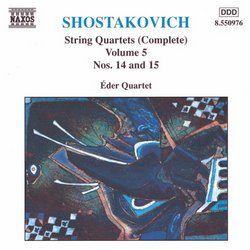 | Dmitry Shostakovich, Eder Quartet Shostakovich: String Quartets (Complete), Vol. 5 Genre: Classical
|
Larger Image |
CD DetailsSimilarly Requested CDs
|
CD ReviewsThe grim spectre of death, hurray! joeythemancunian | Edmonton, Canada | 06/24/2000 (4 out of 5 stars) "Outside of complete Shostakovich quartet sets (which are themselves in surprisingly great supply these days), there works are not recorded very often compared to the earlier ones. The reason for this is hard to know- I find them to be quite close to the level of the late Beethoven quartets, though of course having an entirely different emotional impact.One cause of their unjust neglect may be their lack of a typically 'quartettish' nature. The textures are very lean, often employing just one or two instruments, this probably being a reflection on both Shostakovich's mood at the time and the poor condition of his hands. 'Skeletal' is a word that fits both the mood and texture of these quartets. Although this could be a sign of laziness in the case of a lesser composer, one can easily feel that Shostakovich would have written them in exactly the same way even if his hands were not so thoroughly crippled.For those who are looking for an introduction to Shostakovich's darkest works or angsty music in general, this is a good place to start. The price is obviously right, the liner notes are satisfactory (though when owning the complete Shostakovich quartets and symphonies on 17 CDs, it does get tiresome to read the same many-paged biography of Shostakovich in each set of liner notes), the recording quality is very high, and the quartet capture the mood of these works very well, not making any effort to smooth out these works that only cease to be brutal when they are lamenting." Shostakovich's Last Quartets Robin Friedman | Washington, D.C. United States | 10/24/2006 (5 out of 5 stars) "A great deal of the music of Shostakovich (1906 - 1975) was composed under the spectre of communism and the fear of political pressure. But in his chamber music and in his last works, Shostakovich reached an intensity and poignancy of personal expression that few composers can surpass. This is particulary true of Shostakovich's final two string quartets, composed in 1973 and 1974. Impending death, melancholy, and reflection were reflected in these two works. Shostakovich's two final quartets are included on this CD beautifully played by the Eder quartet as part of its recording of the complete cycle of Shostakovich's fifteen string quartets on Naxos.
Shostakovich's 14th and 15th quartets are both spare in texture and tightly constructed. They include intricate part-leading and long solo laments especially for the lower voices of the ensemble, the cello and viola. Themes are integrated and repeated across movements and, although the works are tonal in character, Shostakovich shows the influence of Schoenberg and his school in his use of twelve-tone themes. Most importantly, this is melancholy, death-haunted music leavened with passages of serenity. I first heard the final string quartet no. 15 in E flat minor, in a performance by the Julliard String Quartet at the Library of Congress in 1975. This was surely one of the earliest American performances of the work, and the memory of that evening has remained with me. The quartet is highly unusual in form consisting of six slow movements. It is deeply pensive and the work of a composer who was facing death. The work opens with a lengthy movement titled "Elegy" which features each of the four voices entering in turn in music of sad, intense intimacy. There are long, poignant solo passages at the heart of each of the succeeding movements, particularly at their beginnings. The cello sings a 12 tone theme in the second movement, marked seranade, while the first violin has an anguished, angular running solo in the brief intermezzo. The centerpiece of the work is the Funeral March, the fifth movement, with its characteristic rhythmic structure and its melancholy deep-voiced solos. The final movement, marked "Epilogue" recapitulates much of the earlier music in the quartet, especially the funeral march, and brings the work to melancholy closure. Shostakovich's 14th quartet in F sharp minor is of a more conventional three-movement structure with alternating fast and slow movements. This quartet too features lengthy spare solo lines and duets for the cello and the viola. The opening movement of this work has an angular, anguished character that is largely absent from the melancholy of the final quartet. But in the middle of the slow movement of the 14th quartet, Shostakovich attains a moment of peace and serenity in the voice of the cello. The finale to the quartet I found ambiguous in character. It opens with the plaintive character of the opening movement but works gradually into a slow, peaceful close with recollections of the theme of the middle movement. Shostakovich's final quartet has not faded for me since the time I heard the music when it was new, long ago. I found the 14th quartet more difficult to approach but also rewarding. This CD will appeal to listeners who want to explore some of the 20th century's finest efforts in the genre of the string quartet. Robin Friedman" |

 Track Listings (9) - Disc #1
Track Listings (9) - Disc #1